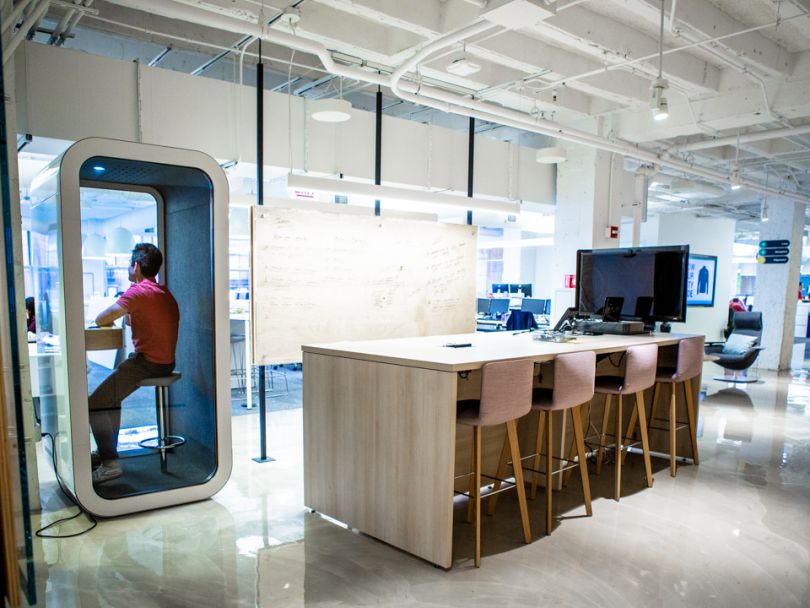A certain South African techie in California might say the future of transportation is a bullet-proof angular truck, but in many ways, the future of transportation is already here.
“Everyone jumps to autonomous cars and what the future is going to look like. But transportation is already changing with companies like Uber and Lyft and the rest of the shared mobility industry,” said Gary Hallgren, president of Arity, a mobility data and analytics company. “Look at all the on-demand delivery that’s going on now — that is changing the usage of vehicles in a different way.”
When Arity spun out of The Allstate Corporation in 2016, it would have been difficult to predict just how valuable driving data would become for multiple industries and real people.
By collecting roughly 1 billion miles of driver data every two days (and 2 million trips per hour), which is then applied to Arity’s software and data models, the company can leverage insights into previously untapped areas, like weather predictions for commuters or safety features for new drivers.
At its core, Arity is making the roads safer.

Data that goes the distance
The insights Arity delivers are more accurate than other means of data collection because, in Hallgren’s words, they’re “common sense.” Instead of judging someone on, say, their credit score to determine their insurance rate, Arity helps companies assess how drivers are actually acting behind the wheel.
“When everybody owned their own car, it used to be that insurers would assess risk based on who the person driving was: where they live, how long have they have been driving and other aspects about them,” Hallgren said. “But moving into these new forms of mobility, the data around what you do is going to be more important than who you are.”

In a world of gridlocked traffic and long commutes, there’s one certainty: transportation is messy. Annually, there are approximately 40,000 car accidents that occur in the United States.
“The transportation system, in general, is broken,” Hallgren said.
A University of Chicago study found that in places with rideshare services, deadly traffic accidents are 2 to 3 percent more likely to occur.
And that’s where Arity’s data and analytics can step in.
“Driver behavior is equally as interesting for Uber, Lyft, Amazon Flex, Postmates and all of the gig economy or delivery apps,” Hallgren said. “All of those companies are trying to find the best drivers so that they can deliver services efficiently and at the lowest cost.”
Where Arity gets its data
On-board diagnostics (commonly referred to as an OBD), can shed light on a lot of driving patterns, but the most effective tool for gathering data is one that has a gyroscope, a barometer, a magnet and virtually never leaves the user’s side: a cell phone. “With a device in a car, you might know how aggressively someone is driving, but with a phone, you also know that they’re picking up and using the phone,” Hallgren said. “We all think using a phone while driving is risky, but how do you truly quantify that risk? That’s where Arity's data anayltics really comes into play.”
Aside from making ride-hailing safer, Arity can help families and individuals drive safer. Through a partnership with family tracking and networking app Life360, Arity’s understanding of driver data can flag when elderly or new drivers need more driving practice or some supervision before heading back on the road. There’s also a crash detection feature that can call emergency services if an accident occurs.
In 2019, that technology helped detect 37,000 collisions, the company said.
Additionally, Arity recently partnered with WeatherBug to help drivers stay safe even in inclement weather. Thanks to Arity’s software development kit (SDK), WeatherBug can now predict what the forecast is on the other side of a user’s commute or even suggest alternate routes in the case of bad weather.
The implications of these features aren’t lost on Hallgren: “We truly are saving lives with this technology.”

A driven culture
Although its parent company is an enterprise giant, Arity is small enough to outmaneuver competitors. With fewer than 400 employees, 65 of whom are data scientists, it’s the right size to make a dent in the world of transportation without the slow grinding gears that are associated with some legacy companies. It’s also free of the decisions that come from outside funding that can hinder productivity and progress.
“In very large companies, sometimes you feel like you’re working on big solutions, but you might not feel that your contribution is readily apparent or that you have much control,” Hallgren said. “Being the size we are, we’re in a great spot to do a lot of meaningful work, and we have the resources to really make a difference.”
While the future of transportation may someday involve autonomous cars communicating with one another as they navigate through formerly gridlocked streets — say, “a model that will say that a Volvo S80 does not play well with a BMW X5 on city streets in bad weather,” Hallgren said — today it looks a lot more like sifting through data.
“Everyone wants to work with large amounts of data,” Hallgren said. “To do that and work on a problem that can actually change society is a really compelling value proposition for our team.”
"occur" - Google News
February 17, 2020 at 10:40PM
https://ift.tt/37zZOhN
Arity's President on Leveraging 250 Billion Miles of Data For Safer Roads - Built In Chicago
"occur" - Google News
https://ift.tt/2UoDqVw
Shoes Man Tutorial
Pos News Update
Meme Update
Korean Entertainment News
Japan News Update
Bagikan Berita Ini















0 Response to "Arity's President on Leveraging 250 Billion Miles of Data For Safer Roads - Built In Chicago"
Post a Comment